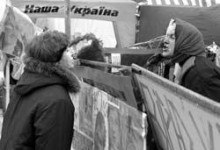Ukraine celebrated Freedom Day on Nov. 22: two years ago tens of thousands of people went to the Maidan Nezalezhnosti (Independence Square) in Kyiv to defend the principles of democracy and freedom. The Orange Revolution succeeded, the third round of the presidential elections took place and Viktor Yushchenko won.
Today, however, the victorious political forces that came to power two years ago marked the revolution’s anniversary with restraint. There was much talk of the nation’s unification, but only within a narrow circle.
The key figure in those events, Ukraine’s President Yushchenko, preferred to celebrate the event among his aИ?sworn brothers from different political forces’ in Mariinsky Palace. “I want to invite them to Mariinsky Palace, to hold a presidential soiree, invite diplomats there, as well as all those whom I saw at the Maidan two years ago, those who made great efforts to ensure that the Orange Revolution took place,” the president stated in his interview broadcast on three national channels on the eve of the festivities.
The president’s political “brothers-in-arms” had their own views of the anniversary. One of the revolution’s main political forces, the Our Ukraine bloc, also refused to hold mass actions. The fraction’s leader, Roman Bezsmertny, does not think the second anniversary of the Orange Revolution should be marked with pomp. In his opinion, only the first should be celebrated, and perhaps later, the revolution’s fifth anniversary. “I don’t know what the situation will be like in five years, whether this day will remain Freedom Day or whether it will be called Maidan Day, or by some other name,aИЭ Bezsmertny said on Radio Era.
Ironically, the revolution’s “princess,” Yulia Tymoshenko, celebrated Freedom Day in Brussels, where she was visiting as the leader of Ukraine’s parliamentary opposition. She stated earlier that the BYuT is not going to mark the revolution’s anniversary, since there is still “plenty of work to do.” She is ready to apply every effort so that the political reform is repealed, and she is counting on extraordinary parliamentary elections that may be held next summer.
The BYuT leader shared these plans at the conference “Ukraine: Is the Future Still Orange.” According to Tymoshenko, democratic forces will apply to the Constitutional Court to declare the changes introduced into the Constitution of Ukraine in 2004 null and void. This means returning the president to power, she emphasized.
The author of the political reform, Socialist Party leader Oleksandr Moroz, is concerned not so much about the festivities as about preserving his political creation. So he has no time for celebrations, especially since that day he had a meeting with the Greek ambassador.
Prime Minister Yanukovych was the only one who did not conceal his excitement. This is no surprise. Yushchenko’s political opponent, the “villain” of the Maidan, has obtained everything that he had already given up dreaming about. So his statements were the most enthusiastic.
At the beginning of the government’s expanded session, the prime minister declared that the events of two years ago divided society on the one hand, and on the other, provided an opportunity to advance mutual understanding. Yanukovych thinks that the time for unity has come, and it is important that this unification has taken place on a higher political level. The prime minister underlined that the anticrisis coalition also professes democratic values. “I am convinced that we will build a new development strategy for our country thanks to this new understanding,” he stated.
What about the Maidan?
Despite the high level of disillusionment with politicians, Ukrainian society’s protest potential remains high. The only correction could be intensification of the social course and discontent.
Proof of this is the latest nation-wide sociological study conducted by the Gorshenin Institute. According to one of the institute’s analysts, “If the war of values formed the basis of the Maidan in 2004, today 43.3 percent of respondents say that the rising costs of public utilities may become a stimulus. Then 32.2 percent of the people will hit the streets to protest the government’s gross injustice.”
Therefore, if mass actions of protest are possible in the nearest future, they will be more socially oriented.







